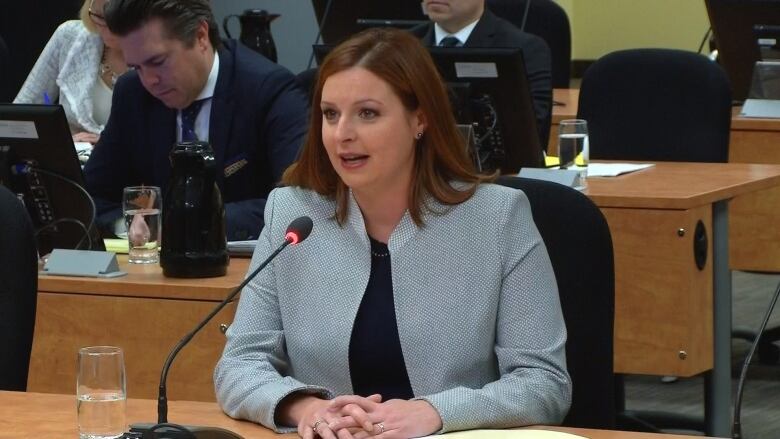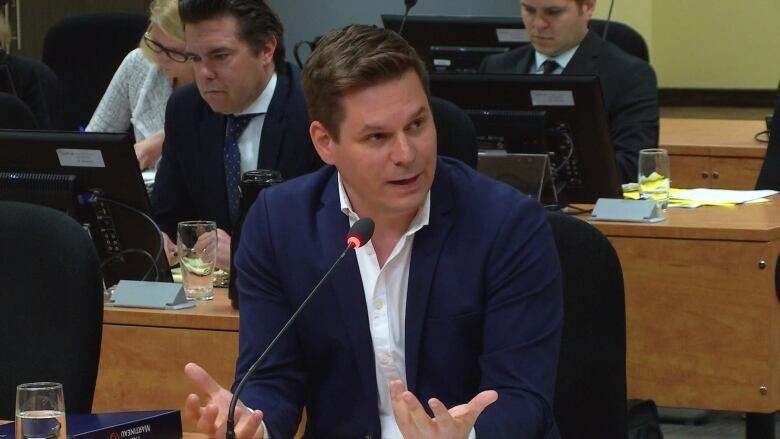Journalists at centre of police surveillance scandal testify at Chamberland commission
Radio-Canada's Marie-Maude Denis and Patrick Lagac of La Presse latest to testify at public inquiry

Two journalists at the centre of the controversy over police surveillance of media figures in Quebec testified Thursday that confidential sources are vital to their work, and to the health of democracy in the province.
Radio-Canada'sMarie-MaudeDenis and PatrickLagacof LaPresse appeared Thursday before the provincialcommission examining the issueled by Quebec Court of Appeal Justice Jacques Chamberland.
CBC/Radio-Canada is a participant in the commission.
Denis, who has been withRadio-Canada's investigative program Enqutesince 2008, took the stand first and spoke of her shock when she learned Quebec's provincial police had been given access to her cellphonerecords between 2008 and 2013.
"I found it extremely intrusive they describe my life in detail, where I was, what time, who I was talking to, what was happening ... I was looking at it line by line by line and after 20 minutes I stopped because I was too disgusted, too angry," she told the hearing. "They have my whole life for five years."
Police surveillance of journalists, she said, is nothing short of a threat to democracy.
"Investigative journalism is fundamental for a healthy democracy," she said.
Without confidential sources, Denis added, there is no investigative journalism.
Allegation of affair a 'calumny'
Denis refuted an allegation made in the police warrant requesting access to her phone records that she had been involved in an intimate relationship with Denis Morin, the former head of the Sret du Qubec squad investigating corruption in Quebec's construction industry.
That allegation was central to the request by the SQ's professional standards division, which was investigating how journalists obtained information from a police wiretap on Michel Arsenault, the former president of the FTQ, Quebec's largest labour federation.
- Quebec police spying scandal widens: 5 years of call logs and another journalist
- 'When will it stop?': former SQ director was frustrated by media leaks
Denis called the allegation that she was involved with Morin a "calumny."
"There's not an ounce of truth in that allegation and I find it really disgraceful for allpolice officers, investigators who care about the truth, that such calumnies are found in a judicial document," she said.
"It sends a clearmessage to current officers, retired officers or anyone who wants to become one never speak with a journalist or, worse, a woman journalist, because you will be investigated as a criminal.You could find yourself in front of a commission of inquiry denying a relationship with a journalist is that where we're at?"
Rumours in legal document serious concern
Denis said such rumours are often the reality for women who succeed in journalism, so she wasn't entirely surprised, but to see them written in a warrant was cause for serious concern.
"Seeing them in a legal document endorsed by a justice of the peace, I was shocked, overcome," she said.
"Putting fabrications like that in a legal document, that's seriousto me, to Denis Morin, to my husband. It's really not a situation that's acceptable."

The warrant allowed the SQto retroactively track the cellphone records of six prominent investigative journalists, including Denis's Radio-Canada colleagues Alain Gravel and Isabelle Richer.
In all, seven Quebec journalistsare known to have been spied on by the SQ in an attempt to identify internal sources leaking information.
Lagac's confidence in police shaken
In his testimony, Lagac said his confidence in police has been shaken by the revelations that Montreal police were spying on his cellphone communications.
"Instinctively, I didn't think it was so easy to get a warrant targeting a journalist," he said.
- Surveillance of Montreal reporter a 'serious attack on freedom of the press in Canada'
- Montreal reporter put under police surveillance for intimidation, he says
The warrants were part of investigations by SPVM internal affairs investigators into a series of leaks to journalists, including a 2012 traffic ticket issued to Denis Coderre before he became mayor of Montreal that was passed along to Lagac.
In testimony before the commission, Coderre admitted to being furiouswhen he found out Lagac obtained the ticket through "police sources" and asked if the mayorever paid it.
Coderre said he called Marc Parent, the city's police chief at the time, to express his anger with the leak.

Lagacclaimed the mayor'stestimony was evidence of the Coderre administration's "paranoid" controlof information, and he saw his own surveillance in that context.
Lagac echoedDenis'concern for the"chilling effect" surveillance could have on confidential sources.
"Without confidential sources, little journalism of value is possible," he said. "People accept speaking with journalists in exchange for a certain form of confidentiality in order to speak freely and pass along documents because they believe it's inthe public interest."
For that reason, he said, it's vital to protect confidential sources.
Lagac recommended that Superior Court of Quebec justices be the ones to hear warrant requests concerning journalists, rather than justices of the peace.
With files from Sudha Krishnan and Radio-Canada












_(720p).jpg)


 OFFICIAL HD MUSIC VIDEO.jpg)
.jpg)



























































































